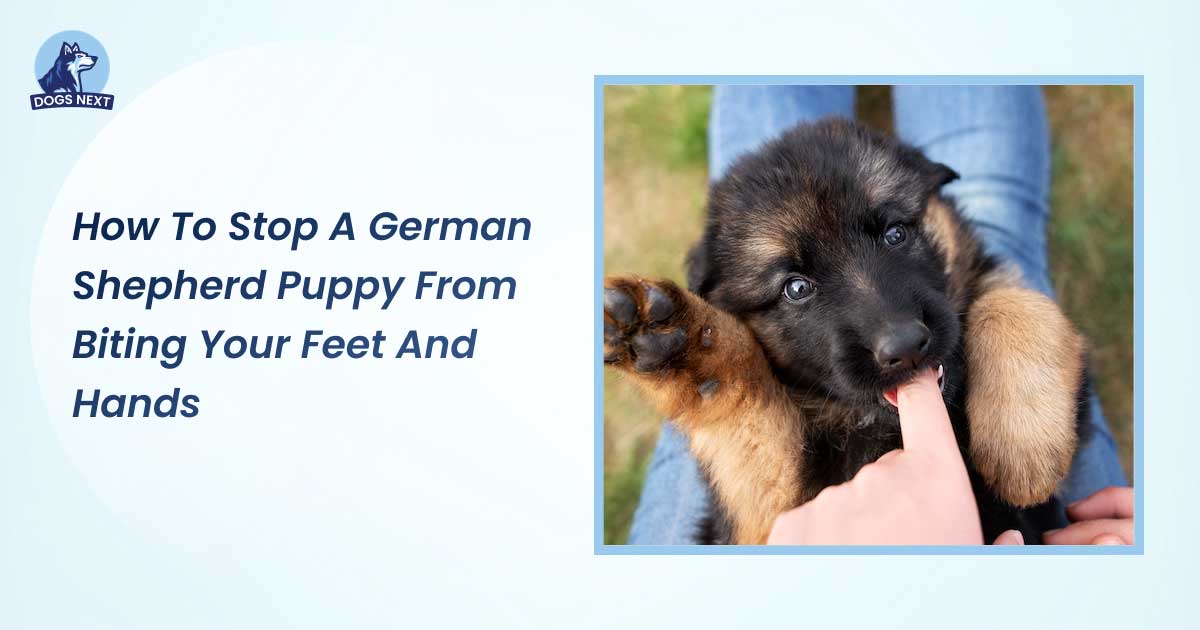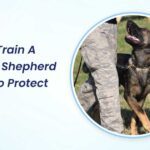To stop a German Shepherd puppy from biting your feet and hands, redirect its attention to toys. Consistently reward good behavior with treats and praise.
German Shepherd puppies are energetic and curious, often exploring the world with their mouths. Training them to avoid biting requires patience and consistency. Start by providing chew toys to keep their attention away from your hands and feet. Always reward positive behavior with treats and verbal praise to reinforce good habits.
Socializing your puppy early can also help reduce biting tendencies. Enroll in obedience classes to teach basic commands and improve overall behavior. Remember, consistency is key in training. With time and effort, your puppy will learn to play gently and respect boundaries.
Teaching Bite Inhibition
German Shepherd puppies are known for their intelligence and energy, but they can also be quite nippy. Teaching bite inhibition is crucial to ensure your puppy learns to control its bite. This process helps reduce the risk of your puppy biting too hard and causing injury. Below, we’ll explore effective methods to help you with puppy bite training.
Allowing Gentle Play Only
Bite inhibition puppy training starts with allowing gentle play only. This teaches your German Shepherd puppy the difference between soft and hard bites. Follow these steps:
- Play with your puppy gently and observe its behavior.
- When your puppy bites too hard, let out a high-pitched yelp. This mimics how other puppies react.
- Immediately stop playing and ignore your puppy for a short period.
- Resume play when your puppy calms down and bites more gently.
Consistency is key. Every family member should follow these rules to ensure the puppy understands biting too hard ends playtime. This teaches the puppy that gentle play is acceptable.
| Action | Response |
|---|---|
| Hard bite | Yelp and stop play |
| Gentle bite | Continue play |
Redirecting To Chew Toys
Redirecting to chew toys is another effective method for puppy biting control. Puppies need to chew as part of their development. Providing appropriate chew toys can help. Follow these steps:
- Have a variety of chew toys available for your puppy.
- When your puppy bites your hands or feet, say “no” firmly.
- Immediately give your puppy a chew toy to redirect its biting behavior.
- Praise your puppy when it starts chewing on the toy instead of your hands or feet.
This method helps your puppy associate biting with chew toys, not human hands or feet. It also satisfies the puppy’s natural chewing instinct, making it less likely to bite inappropriately.
Puppy bite training involves patience and consistency. By redirecting your puppy’s attention to chew toys, you teach it acceptable behaviors while keeping your hands and feet safe.
Using Firm Commands For Bites
Using firm commands for bites is essential for how to stop puppy biting. German Shepherd puppies are smart and can learn commands quickly. Here’s how:
- Use a firm voice to say “no” or “ouch” when your puppy bites.
- Make direct eye contact to convey that you are serious.
- Stop all interaction with your puppy for a few seconds after giving the command.
- Resume playing only when your puppy has calmed down and stopped biting.
Consistency is vital. Ensure all family members use the same commands and reactions. This reinforces the behavior you want to see.
By using firm commands, your puppy will learn that biting is unacceptable. This method complements other puppy bite inhibition techniques, creating a well-rounded approach to training your German Shepherd puppy.
Creating A Consistent Training Routine
Training a German Shepherd puppy to stop biting your feet and hands is crucial. Puppies are naturally curious and use their mouths to explore. Creating a consistent training routine is key to ensuring your puppy understands boundaries. Consistency helps your pup learn faster and reduces confusion.
Using The Same Cues Each Time
Using the same cues each time is essential for consistent dog training. Puppies learn through repetition. If you use different words or signals, your puppy might get confused. Choose simple commands like “No Bite” or “Stop” and stick with them.
Here are some tips for using cues:
- Use a firm tone but avoid yelling.
- Pair the verbal cue with a hand signal.
- Be patient and give your puppy time to learn.
For example:
| Scenario | Cue |
|---|---|
| Puppy bites your hand | Say “No Bite” and gently remove your hand |
| Puppy bites your feet | Say “Stop” and move your feet away |
Consistency in cues ensures your puppy knows what to expect. This makes the training routine bite prevention effective and smooth.
Rewarding Good Behavior Consistently
Rewarding good behavior consistently is crucial in stopping a biting puppy. Rewards reinforce positive actions. When your puppy stops biting, give a treat or praise immediately.
Here are some effective rewards:
- Treats – Small, tasty, and easy to chew.
- Praise – Positive words like “Good job!”
- Playtime – A favorite toy or a fun game.
Create a reward schedule to ensure consistency:
| Behavior | Reward |
|---|---|
| Stops biting when told | Treat and praise |
| Plays gently with toys | Extra playtime |
Consistency in rewards helps your puppy understand what behavior is expected. This makes the bite prevention routine more effective.
Involving All Family Members
Involving all family members ensures that everyone is on the same page. Consistency is key in training routines. If everyone uses the same cues and rewards, the puppy learns faster.
Here’s how to involve everyone:
- Hold a family meeting to discuss the training plan.
- Agree on the cues and rewards to be used.
- Assign roles to each family member.
Create a training chart to track progress:
| Family Member | Role |
|---|---|
| Mom | Morning training and rewards |
| Dad | Evening training and playtime |
| Kids | Afternoon training and treats |
Consistency across all family members helps reinforce the training routine bite prevention methods. This creates a structured environment for the puppy.
Encouraging Positive Socialization
Stopping a German Shepherd puppy from biting your feet and hands involves many methods. One of the most effective ways is encouraging positive socialization. Positive socialization helps your puppy learn how to interact with other dogs and people, reducing fear and anxiety. This makes them less likely to bite out of fear or playfulness.
Exposing Puppy To Other Dogs
Exposing your puppy to other dogs is crucial for their social development. It helps them understand how to play and interact without biting. Here are some effective ways to do this:
- Puppy Playdates: Arrange playdates with other friendly puppies.
- Puppy Classes: Enroll in a puppy socialization class.
- Dog Parks: Visit dog parks during off-peak hours.
These activities allow your puppy to meet other dogs in a controlled environment. They learn the social cues and limits from their canine friends. This reduces biting behavior as they understand how to play properly.
Always supervise these interactions to ensure safety. If you notice any aggressive behavior, intervene calmly. Positive reinforcement is key. Praise your puppy when they play nicely without biting.
Teaching Appropriate Play
Teaching appropriate play is essential to stop your German Shepherd puppy from biting. Here are some positive socialization tips:
- Use Toys: Provide chew toys and encourage your puppy to bite these instead of your hands or feet.
- Interactive Games: Play games like fetch or tug-of-war using toys, not your hands.
- Redirect Behavior: If your puppy bites, say “No” firmly and offer a toy to chew instead.
Interactive games and toys keep your puppy engaged and teach them what is appropriate to bite. Consistency is crucial. Always redirect biting to toys and avoid using your hands or feet in play. Safe play training helps your puppy understand boundaries and reduces unwanted biting behavior.
Minimizing Fear-based Biting
Minimizing fear-based biting involves creating a safe and calm environment for your puppy. Here are some steps to achieve this:
- Gradual Exposure: Expose your puppy to new experiences slowly and positively.
- Positive Reinforcement: Reward calm behavior with treats and praise.
- Safe Spaces: Provide a safe space like a crate where your puppy can retreat and feel secure.
Fear-based biting often occurs due to anxiety or fear. Gradual exposure to new experiences helps your puppy feel more confident. Positive reinforcement ensures they associate new experiences with positive outcomes. Safe spaces provide a retreat when they feel overwhelmed.
By focusing on puppy socialization and creating a supportive environment, you can effectively socialize your puppy and reduce biting. Remember, patience and consistency are key. Positive socialization leads to a well-adjusted, happy puppy.
Frequently Asked Questions
Why Do German Shepherd Puppies Bite Hands?
German Shepherd puppies bite hands due to teething and exploring their environment. It’s a natural behavior. Redirect their biting to toys.
How Can I Stop Puppy Biting?
To stop puppy biting, provide chew toys, use positive reinforcement, and maintain consistent training. Redirect biting gently.
Are Chew Toys Effective For Biting?
Yes, chew toys are effective for biting. They satisfy teething needs and divert attention from your hands and feet.
Is Biting Behavior Normal For Puppies?
Yes, biting behavior is normal for puppies. They explore their world and relieve teething discomfort. Proper training helps.
Conclusion
Consistency is key to stopping your German Shepherd puppy from biting. Use positive reinforcement and patience. Remember, training takes time. Offer chew toys to divert their attention. Always reward good behavior. Soon, your puppy will learn to keep those sharp teeth to themselves.
Happy training!

I’m David, an expert contributor and writer, with two furry friends of my own, I know the challenges of raising and caring for dogs. From training to nutrition and health, my goal is to provide valuable insights and advice to help create strong bonds and happy, healthy lives. Find me in Twitter.




